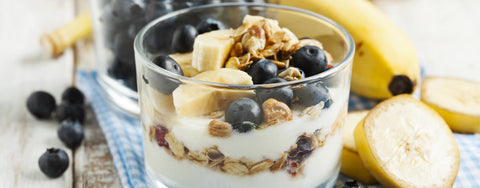What is an Ideal Breakfast?

What is an Ideal Breakfast?

Breakfast is the first meal of the day designed to break the fast after the night period and usually consumed within 2 to 3 hours of waking; it commonly contains a food or beverage from at least one food group. The recommended amount of calories that a healthy breakfast should provide is between 15 to 25% of the total daily energy intake. This range will vary according to the person’s age, sex, daily energy requirements and lifestyle. Breakfast habit appears to be less frequent when children enter teenage years and in some cases they go back to it during adulthood; however, there is a still proportion of the population missing breakfast every day1.
A survey conducted in England among 481 adolescents showed that 18% of the group were skipping breakfast for different reasons and this looks like the case in most European countries. Even though there is flexibility on which food groups should be consumed, a protein-rich, nutrient-dense, carbohydrate-rich are considered essential to replenish nutrients in particular glycogen storage after the period of fasting while sleeping2.
To support this healthy habit, Herbalife offer a range of products which are ideal to be consumed first thing in the morning, In order to start your day with the right amount of protein, opt for a F1 shake which provides around 18 grams of protein when prepared with semi skimmed milk. F1 shakes will also deliver more than 20 vitamins and minerals which contribute to achieve your daily Nutrient Reference Values (NRVs). For those with increased needs of protein, for example sports people, adding extra scoops of PPP will boost protein content even further. You can also boost your F1 shake with extra fibre by adding Oat Apple Fibre or even Beta heart , which contains oat beta-glucan to help contribute to lower your blood cholesterol. High cholesterol is a risk factor in the development of coronary heart disease. The beneficial effect is obtained with a daily intake of 3 g of oat beta-glucan. The aim should be to achieve between 10 to 20% of the Daily Reference Value (DRVs) for vitamins, minerals, and fibre on this first meal1.
A daily breakfast provides a wide range of health benefits on physical and mental health. Evidence suggests that those having breakfast have shown less health-compromising behaviours and benefited from reduced health risk factors while making more healthy food choices overall. In other words, breakfast eaters usually have healthier habits throughout the day and this will result in a positive impact in their overall health; better weight management; disease prevention from having the right nutrients; etc. Breakfast intake can potentially favour the metabolic and hormonal responses of individuals so as consequently decrease the total calorie a person has during the rest of the day. This can be explained mainly because having breakfast will cut the fast and the person will have a better control of the hormones which regulate hunger3.
As opposed to the popular belief, skipping breakfast is not an effective method for weight control4. Moreover, a high-protein breakfast has been associated with higher appetite control and a daily reduction in the desire to eat, as a result, improving weight management 5. This was actually evident in a study showing that there is a favourable association between having daily breakfast and normal anthropometrics measures, so those having a daily breakfast were more prone to have a BMI among normal ranges6.
Breakfast habit is not an easy every day practice for most of the people; however, adapting the food selection to individual needs will help to encourage improving this habit and keeping it throughout time. Whatever your food selection is, make sure you get up to 30% of your total daily calories from protein, 40% from carbohydrates and 30% from fats as recommended in Herbalife Global Nutrition Philosophy. This way you will assure your dietary patterns are balanced and well distributed. Allow having protein in each of your meals so as to be evenly spread and more efficiently used by the body.
References:
- O’Neil, C. B.-B., C. Hayes, D. Jana, L. Klinger,SE. Stephenson, Martin. . (2014). The role of breakfast in health: Definition and criteria for a quality breakfast. . J Acad Nutr Diet, 3(S8-S26).
- Mullan et al. (2014). An examination of the demographic predictors of adolescent breakfast consumption, content, and context. BMC Public Health. 14:64
- Chowdhury, E. R., JD. Tsintzas, K. Thompson, D. Betts, JA. (2015). Carbohydrate-rich breakfast attenuates glycaemic, insulinaemic and ghrelin response to ad libitum lunch relative to morning fasting in lean adults. British Journal of Nutrition. 114, 98.
- Cho, S. D., M. Brown, C. Clark, CA. Block, G. (2013). The Effect of Breakfast Type on Total Daily Energy Intake and Body Mass Index: Results from the Third National Health and Nutrition Examination Survey (NHANES III). Journal of the American College of Nutrition, 22(4), 296.
- Leidy, H. H., HA. Douglas, SM. Higgins, KA. Shafer, RS. (2015). A high-protein breakfast prevents body fat gain, through reductions in daily intake and hunger, in “Breakfast skipping” adolescents. Obesity. 23(9), 1761.
- Azadbakhtm, L. H., F. Feizi, A. Esmaillzadeh , A. (2013). Breakfast eating pattern and its association with dietary quality indices and anthropometric measurements in young women in Isfahan. Nutrition. 29, 420.
